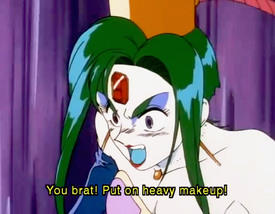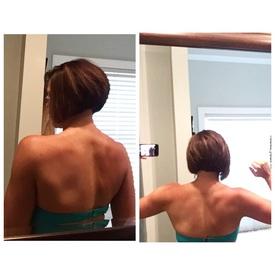eating disorder
Replies
-
I'm pretty sure I have an Exercise Disorder. Maybe an unhealthy obsession with it. I'm in the gym 2 hours a day/7 days a week typically. I used to be this way and ended up weighing less than 90 pounds for a while. Ugh.
Once I lose these last 10 pounds, I'm going to need you guys again for a completely different reason, lol.0 -
I'm pretty sure I have an Exercise Disorder. Maybe an unhealthy obsession with it. I'm in the gym 2 hours a day/7 days a week typically. I used to be this way and ended up weighing less than 90 pounds for a while. Ugh.
Once I lose these last 10 pounds, I'm going to need you guys again for a completely different reason, lol.
Try and incorporate a day off and ENJOY it...maybe get your nails done or your hair done. Or go to a movie! Do something that is a treat that you will look forward to. You dont need to work out that much that often, but i know how hard it is to stop. Do you feel guilty if you dont go or dont stay as long?0 -
I wouldn't call it an exercise disorder as much as a love for exercise and working out.
If you're exercising for that much time because you enjoy it, i think that's perfectly fine.
The body is made for physical activity! You just need to eat your exercise calories.
If you're getting way too skinny from it, you should work on eating more and building muscle.
My father runs an hour a day and longer on weekends. He doesn't have an obsession with exercise as much as it's his hobby and it's something he loves to do. He also is muscular and is at a healthy weight because of the way he eats. He makes sure to eat a lot to compensate for the large amount of calories he's burning.
I'd say it all depends on your reasons for doing that much exercise.0 -
i want to thank everyone for all their thoughts, advice, ideas....they have all been very thought provoking. I agree, i think that logging my cals etc will help keep me accoutable. I think i just get discouraged because i have been battling anorexia for over half my life and wonder if recovery is ever really going ot be possible for me. But seeing/hearing all the positive things you all have to say really gives me hope. Thanks again!!
Oh and thanks for making me feel so welcome here.....i am so embarassed by my disease and was hesitant to post...0 -
I haven't read all of the responses but I do believe I have an eating disorder although it's never been diagnosed by a doctor. It's not just the emotional eating, binge eating or food obsessions, which are bad, but I used to get panic attacks (while dieting) if I didn't get that "overly stuffed, I'm going to yack" feeling. I would seriously have little mini freak outs, sweating, shaking, etc. if I went to bed and wasn't stuffed. I would even go so far as to get out of bed, eat until I was full, really full and then go back to bed, feeling guilty, like a failure, out of control and even crazy... you know, all of the feelings that come with the territory.
I've read, put into action and internalized Dr. Phil's The Ultimate Weigh Solutions and really made choices to change my life and the way I interact with food and it's made all of the difference in the world. All.of.the.difference.0 -
i know how hard it is to stop. Do you feel guilty if you dont go or dont stay as long?
I do! Plus, I noticed that if I take a day off, it's so easy to skip the next day, too...and then I'm out of my habit.
I just came home from the Y and I actually had a message from my trainer saying she noticed my cardio goal is 90 minutes/week and for the last 2 weeks my average has been 327 minutes/week! (I didn't even realize.) This is in addition to strength training at the Y and at home.
And I don't really "enjoy" it but I do enjoy the results.
but I do enjoy the results.
I think it's a sickness I have though. This seems really abnormal, especially if your trainer has to message you to "stop it, already."0 -
This has been a great thread. twincat, I hear you! Please don't ever feel hesitant to post. When I first started reading the posts here, I felt the same way. My eating disorder is SO EVIDENT that while I knew about rhe seriousness of anorexia and bulimia, I guess I didn't really take time to consider that you have some of the same pain, guilt, embarassment and shame that I do. I will never make that mistake again. Thanks, everyone.:bigsmile: :flowerforyou:0
-
I am glad to see that people are being so open about something that is generally viewed as a personal battle. I have EDNOS, which means I am not anorexic or bulemic, but I do have a problem. I binge, I fast, I restrict, I go on diets, I exercise compulsively...etc. I am in the middle of my struggle right now, which has been getting worse recently. I am studying abroad and really on my own for the first time, without anyone to check up on me and make sure I am doing what I should be. I think about food constantly and it is a struggle for me to actually go into the kitchen and eat enough calories. I am one of those people who enjoys fasting, which I know is horrible for your body. It is something that I live with, that I have been living with, and some days are worse than others. Most people think that if you are at a healthy weight, if they can't see a problem, then you are fine. That couldn't be further from the truth.
I am of two minds about the help/hinderance of counting calories vs. exercise on MFP. I think that it is a great tool for some people, but it can easily be harmful for people who are trying to restrict. It goes from being a way to help me get the right nutrition, to being a way for me to make sure that I am keeping within my crazy self-imposed restrictions. That said...I love it here and I think that it is wonderful. To all of you who have eating disorders, just keep trying. That is all we can do.0 -
I'm wondering if anyone has sought professional help (mental health, not medical) and if you are willing to share what part that plays in your struggle. I have been considering seeing a therapist, but don't really know if I should seek out someone who specializes in weight loss, or just see someone I know is a greta therapist.0
-
At the insistance of family and friends, I went to my doctor. Without asking me how I felt, just after I told her the 'symptoms', she told me she wanted to put me on anti-depressants. She couldn't do that without parental permission though (I was 17) and she didn't ask if a parent would sign, just told me I couldn't have them as a result. Then, she sent me to councelling. After a 4 week wait, I went to my appointment- at a family clinic (something I hadn't been told), where I was told they couldn't treat me as I wanted individual councelling, NOT with my family (after all, it wasn't a family issue, it was my issue. My father STILL doesn't know about it) and that they'd refer me over to another clinic, which treated 'young adults'. I never heard anything about it. Can't say I was impressed, to be honest, but I know people who have received much better help0
-
Yikes! Sorry about that experience Rose. I was on a very low dose of prozac for a short period of time, because it also tends to suppress appetite. It worked great for about a month, then not so much. I didn't want to go on a higher dose, so ..... here I am, three years later. I lost about 20 lbs at that time which I have more or less kept off.0
-
i know how hard it is to stop. Do you feel guilty if you dont go or dont stay as long?
I do! Plus, I noticed that if I take a day off, it's so easy to skip the next day, too...and then I'm out of my habit.
I just came home from the Y and I actually had a message from my trainer saying she noticed my cardio goal is 90 minutes/week and for the last 2 weeks my average has been 327 minutes/week! (I didn't even realize.) This is in addition to strength training at the Y and at home.
And I don't really "enjoy" it but I do enjoy the results.
but I do enjoy the results.
I think it's a sickness I have though. This seems really abnormal, especially if your trainer has to message you to "stop it, already."
ive been through many of the same issues, i used to go to the gym twice a day and was so embarrassed to be seen that i joined another gym so people wouldnt realize i was going twice! With time my body got REALLY tired and i began hating working out...so from the advice of a good friend, I began taking one day off and made sure I did something worth while..something to look forward to. and after time i began working even harder the day before the day off knowing there was something good to come!!! It takes time...Good luck!0 -
I binge, I fast, I restrict, I go on diets, I exercise compulsively...etc.
You just describe me in college, after I had lost some weight using Weight Watchers. I, too, enjoyed fasting. If I set a goal, such as a 3 day fast, and I was getting weak (not hungry, just weak to taste something), I would get a box of cookies, or whatever, and chew then spit into a cup. I was doing all that, THEN when it was getting close to my graduation and I was drinking/eating out every weekend, wow did I get bloated and gain weight fast! I guess it was then that I changed my eating/non-eating habits....along with the fact I was moving back home with my parents.
I do enjoy seeing REAL results now that are long term. :flowerforyou:0 -
I think there are varying degrees of eating disorders. I do not take this subject lightly and I do understand that it can be life threatening. I just have a tendency to overeat and I use to binge eat which I haven't done in quite a long time. I hope that anyone facing a serious disorder will get help.0
-
I'm wondering if anyone has sought professional help (mental health, not medical) and if you are willing to share what part that plays in your struggle. I have been considering seeing a therapist, but don't really know if I should seek out someone who specializes in weight loss, or just see someone I know is a greta therapist.
I've used therapy off and on for most of my weight loss journey. It has helped me extensively - but it wasn't geared toward weight loss. Really, I ate to cover pain that I didn't want to deal with, couldn't deal with, or wasn't even ready to acknowledge it existed! Uncovering all those issues and dealing with them has helped more than I can say. I really think that those of us that are obese and/or have food addiction issues are really trying to cover up something - jmho! As I get more healed, I have a more normal relationship with food. That's my $.02!0
This discussion has been closed.
Categories
- All Categories
- 1.4M Health, Wellness and Goals
- 398.2K Introduce Yourself
- 44.7K Getting Started
- 261K Health and Weight Loss
- 176.4K Food and Nutrition
- 47.7K Recipes
- 233K Fitness and Exercise
- 463 Sleep, Mindfulness and Overall Wellness
- 6.5K Goal: Maintaining Weight
- 8.7K Goal: Gaining Weight and Body Building
- 153.5K Motivation and Support
- 8.4K Challenges
- 1.4K Debate Club
- 96.5K Chit-Chat
- 2.6K Fun and Games
- 4.8K MyFitnessPal Information
- 13 News and Announcements
- 21 MyFitnessPal Academy
- 1.6K Feature Suggestions and Ideas
- 3.2K MyFitnessPal Tech Support Questions










